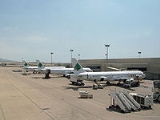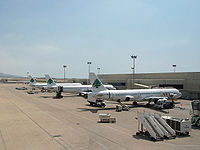
Transport in Lebanon
Encyclopedia
Transportation in Lebanon
varies greatly in quality from the ultra modern Beirut International Airport to poor road conditions in many parts of the country. The Lebanese civil war
between 1975 and 1990 and the 2006 Lebanon War with Israel severely damaged the country's infrastructure.
(OCFTC), or the "Railway and Public Transportation Authority" in English. Buses for northern destinations and Syria leave from Charles Helou Station.
Buses are popular and inexpensive and can be stopped anywhere along the way simply by hailing. Never take a bus without verifying the destination with the driver. The fair is for LBP1000 ($0.6). There are Public Buses (are not regular) and Private Buses (are in general better organized than Public buses).
is another port of entry
. As a final destination, anyone can also reach Lebanon by ferry
from Cyprus or by road from Damascus.
. Service is a lot cheaper than taxis however, to avoid misunderstanding, agreement over the pricing need to be made before setting off.
Service-taxis are probably the most popular means of transportation in Lebanon and recognizable by their red plate and most of them are old white Mercedes. You can take a taxi just by hailing in the street. Watch out, there are no passengers, specify if you would like it as a “taxi” or as a “service-taxi”.
One has to specify one's destination and enter the taxi only if one's destination correspond to the itinerary of the Service-taxi. The driver stops to pick up additional passengers anywhere on the streets and drop them off generally in main squares and main streets. It remains advantageous with very low fares.
Ride To Service-Taxi Taxi
The driver must not pick up additional passengers. Most of these taxis are not equipped with meters, so negotiate the fare before embarking. The estimation of the fare is therefore often an approximate.
Pick up people who have pre-booked by phone. They don’t respond to hails in the street. They don’t have a meter so passengers should agree a price before starting a journey.
is not currently in use, with services having ceased due to the country's political difficulties.
 The main national airport is the Beirut Rafic Hariri International Airport
The main national airport is the Beirut Rafic Hariri International Airport
and is located in the southern suburbs.}
Lebanon
Lebanon , officially the Republic of LebanonRepublic of Lebanon is the most common term used by Lebanese government agencies. The term Lebanese Republic, a literal translation of the official Arabic and French names that is not used in today's world. Arabic is the most common language spoken among...
varies greatly in quality from the ultra modern Beirut International Airport to poor road conditions in many parts of the country. The Lebanese civil war
Lebanese Civil War
The Lebanese Civil War was a multifaceted civil war in Lebanon. The war lasted from 1975 to 1990 and resulted in an estimated 150,000 to 230,000 civilian fatalities. Another one million people were wounded, and today approximately 350,000 people remain displaced. There was also a mass exodus of...
between 1975 and 1990 and the 2006 Lebanon War with Israel severely damaged the country's infrastructure.
Buses
Beirut has frequent bus connections to other cities in Lebanon and major cities in Syria. The Lebanese Commuting Company, or LCC in short, is just one of a handful brands of public transportations all over Lebanon. On the other hand, the publicly owned buses are managed by le Office des Chemins de Fer et des Transports en CommunOCFTC
rightO.C.F.T.C is the Lebanese government authority which operates public transportation in Lebanon....
(OCFTC), or the "Railway and Public Transportation Authority" in English. Buses for northern destinations and Syria leave from Charles Helou Station.
Buses are popular and inexpensive and can be stopped anywhere along the way simply by hailing. Never take a bus without verifying the destination with the driver. The fair is for LBP1000 ($0.6). There are Public Buses (are not regular) and Private Buses (are in general better organized than Public buses).
Ferries
Apart from the international airport, the Port of BeirutPort of Beirut
The Port of Beirut is the main port in Lebanon located on the eastern part of the Saint George Bay on Beirut's northern Mediterranean coast, west of the Beirut River. It is one of the largest and busiest ports on the Eastern Mediterranean...
is another port of entry
Port of entry
In general, a port of entry is a place where one may lawfully enter a country. It typically has a staff of people who check passports and visas and inspect luggage to assure that contraband is not imported. International airports are usually ports of entry, as are road and rail crossings on a...
. As a final destination, anyone can also reach Lebanon by ferry
Ferry
A ferry is a form of transportation, usually a boat, but sometimes a ship, used to carry primarily passengers, and sometimes vehicles and cargo as well, across a body of water. Most ferries operate on regular, frequent, return services...
from Cyprus or by road from Damascus.
Taxis and Services
Apart from buses, the latter are served by either service or taxisTaxicab
A taxicab, also taxi or cab, is a type of vehicle for hire with a driver, used by a single passenger or small group of passengers, often for a non-shared ride. A taxicab conveys passengers between locations of their choice...
. Service is a lot cheaper than taxis however, to avoid misunderstanding, agreement over the pricing need to be made before setting off.
Service-taxis are probably the most popular means of transportation in Lebanon and recognizable by their red plate and most of them are old white Mercedes. You can take a taxi just by hailing in the street. Watch out, there are no passengers, specify if you would like it as a “taxi” or as a “service-taxi”.
Types of taxis in Lebanon
- Service-taxis
One has to specify one's destination and enter the taxi only if one's destination correspond to the itinerary of the Service-taxi. The driver stops to pick up additional passengers anywhere on the streets and drop them off generally in main squares and main streets. It remains advantageous with very low fares.
Ride To Service-Taxi Taxi
- Local
- LBP1.750 ($1.16) LP3.500 ($2.33)
- Long Distance
- LBP5.000 ($3.50) LP30.000 ($20)
- Traditional Taxis
The driver must not pick up additional passengers. Most of these taxis are not equipped with meters, so negotiate the fare before embarking. The estimation of the fare is therefore often an approximate.
- On-call taxis
Pick up people who have pre-booked by phone. They don’t respond to hails in the street. They don’t have a meter so passengers should agree a price before starting a journey.
Trains
The Lebanese rail systemRail transport in Lebanon
Rail transport in Lebanon began in the 1890s and continued for most of the 20th century, but has ceased as a result of the country's political difficulties.-The Ottoman Empire:...
is not currently in use, with services having ceased due to the country's political difficulties.
Airport

Beirut Rafic Hariri International Airport
Beirut Rafic Hariri International Airport is located 9 km from the city centre in the southern suburbs of Beirut, Lebanon and is the only operational commercial airport in the country. It is the hub for Lebanon's national carrier, Middle East Airlines...
and is located in the southern suburbs.}

